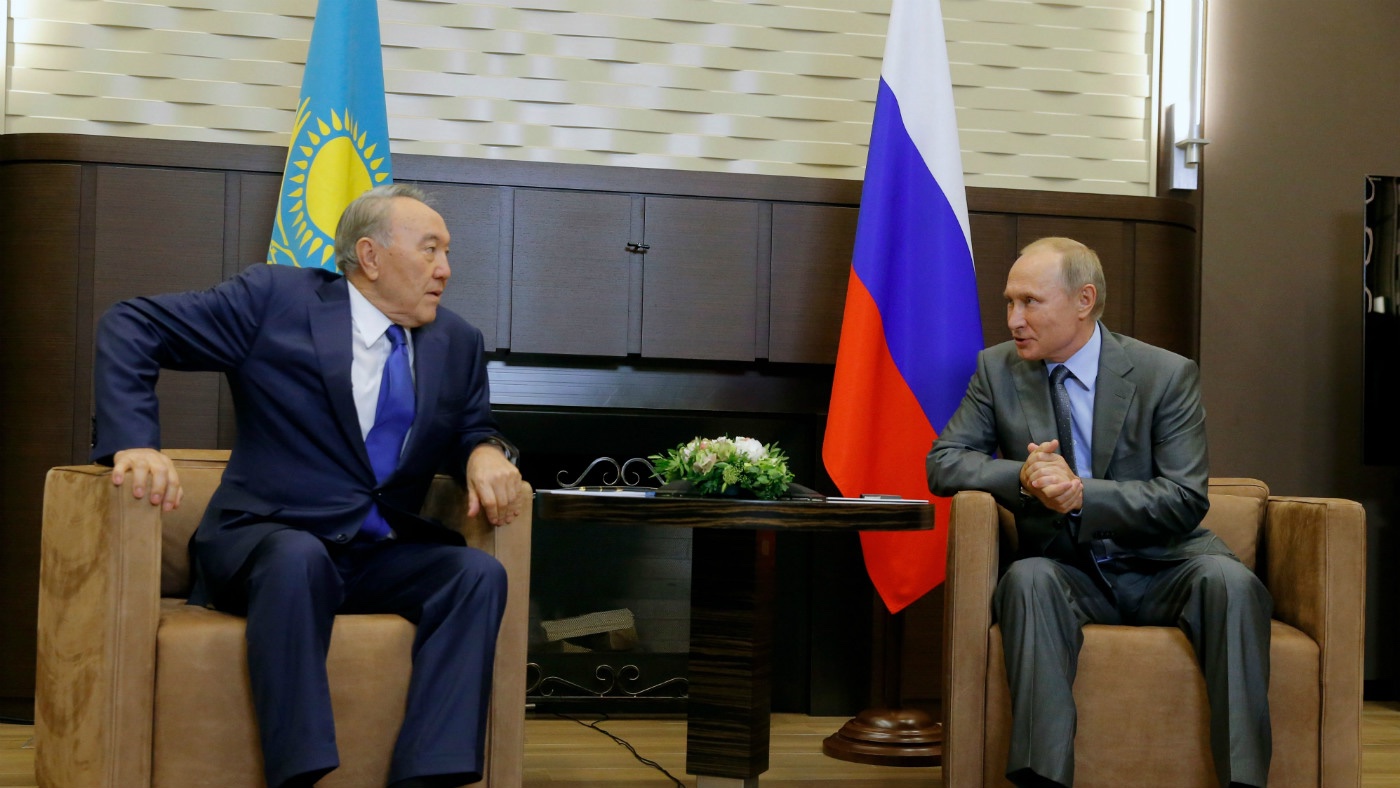Kazakhstan becomes Qazaqstan after switch to Latin alphabet
The country will switch from the Cyrillic alphabet in an effort to distance itself from Russia

A free daily email with the biggest news stories of the day – and the best features from TheWeek.com
You are now subscribed
Your newsletter sign-up was successful
Kazakhstan has announced plans to switch the from Cyrillic to the Latin alphabet, its third change in less than 100 years.
Kazakhstan President Nursultan Nazarbayev has announced that the government of the former Soviet Republic will appoint a commission to oversee the “gradual transition of the Kazakh alphabet to the Latin-based script until 2025,” Al Jazeera reports.
Kazakh is a Turkic language that was written in Arabic script until the 1920s. In 1929 the Soviet Union replaced the Arabic script with Latin, but 11 years later Latin was replaced with the Cyrillic alphabet, to be “more in line with the rest of the USSR”, the BBC says.
The Week
Escape your echo chamber. Get the facts behind the news, plus analysis from multiple perspectives.

Sign up for The Week's Free Newsletters
From our morning news briefing to a weekly Good News Newsletter, get the best of The Week delivered directly to your inbox.
From our morning news briefing to a weekly Good News Newsletter, get the best of The Week delivered directly to your inbox.
Kazakhstan was a Soviet Republic before it declared its independence in 1991, but Russian is still more widely spoken in the country than Kazakh.
The current Kazakh version of the Cyrillic alphabet has 42 characters, 33 are from the Russian alphabet and nine representing specific Kazakh sounds. The new Latin alphabet has 32 letters, leaving some questioning why Kazakhstan is embarking on the confusing quest.
Why the switch?
Nazarbayev has given many reasons for replacing the alphabet, including creating an alphabet that would work better with modern technology. A Kazakh keyboard takes up nearly all number keys, in addition to the standard letter and punctuation keys. The new alphabet will use apostrophes to modify letters. “The country’s name, for example, would be spelled Qazaqstan Respy’blikasy,” says The Guardian.
A free daily email with the biggest news stories of the day – and the best features from TheWeek.com
It could also be an effort to weaken the country’s historical ties to Russia, adds the paper. It will be the third ex-Soviet nation to switch to the Latin alphabet, after Uzbekistan and Azerbaijan.
The new alphabet has also been presented as a way to integrate into the modern world. “Given that over 100 countries in the world use the Latin script, it is crucial for Kazakhstan's integration into the global educational and economic environment,” Gulnar Karbozova, a lecturer at Auezov South Kazakhstan State University, told Kazinform, as cited by Al Jazeera.
What’s Next?
The BBC suggests that the transition won’t be smooth. “The Kazakh word for carrot is ‘сәбіз’ and would traditionally be spelled ‘sabeez’ in Latin,” the broadcaster says. “In the new Latin alphabet though, it will end up as ‘sa'biz’. This, again, is awfully close to the Latin spelling of an extremely rude Russian swear word.”
Twitter users had their own concerns.
By the end of the year all Latin spellings will be finalised and by the end of 2018 new textbooks and teacher training will be developed.
By 2025 all official paperwork in Kazakhstan will be in the Latin script, but as Russian is still spoken by 85% of the population, signs and official documents will remain bilingual.
-
 Political cartoons for February 12
Political cartoons for February 12Cartoons Thursday's political cartoons include a Pam Bondi performance, Ghislaine Maxwell on tour, and ICE detention facilities
-
 Arcadia: Tom Stoppard’s ‘masterpiece’ makes a ‘triumphant’ return
Arcadia: Tom Stoppard’s ‘masterpiece’ makes a ‘triumphant’ returnThe Week Recommends Carrie Cracknell’s revival at the Old Vic ‘grips like a thriller’
-
 My Father’s Shadow: a ‘magically nimble’ film
My Father’s Shadow: a ‘magically nimble’ filmThe Week Recommends Akinola Davies Jr’s touching and ‘tender’ tale of two brothers in 1990s Nigeria
-
 Epstein files topple law CEO, roil UK government
Epstein files topple law CEO, roil UK governmentSpeed Read Peter Mandelson, Britain’s former ambassador to the US, is caught up in the scandal
-
 Iran and US prepare to meet after skirmishes
Iran and US prepare to meet after skirmishesSpeed Read The incident comes amid heightened tensions in the Middle East
-
 Israel retrieves final hostage’s body from Gaza
Israel retrieves final hostage’s body from GazaSpeed Read The 24-year-old police officer was killed during the initial Hamas attack
-
 China’s Xi targets top general in growing purge
China’s Xi targets top general in growing purgeSpeed Read Zhang Youxia is being investigated over ‘grave violations’ of the law
-
 Panama and Canada are negotiating over a crucial copper mine
Panama and Canada are negotiating over a crucial copper mineIn the Spotlight Panama is set to make a final decision on the mine this summer
-
 Why Greenland’s natural resources are nearly impossible to mine
Why Greenland’s natural resources are nearly impossible to mineThe Explainer The country’s natural landscape makes the task extremely difficult
-
 Iran cuts internet as protests escalate
Iran cuts internet as protests escalateSpeed Reada Government buildings across the country have been set on fire
-
 US nabs ‘shadow’ tanker claimed by Russia
US nabs ‘shadow’ tanker claimed by RussiaSpeed Read The ship was one of two vessels seized by the US military